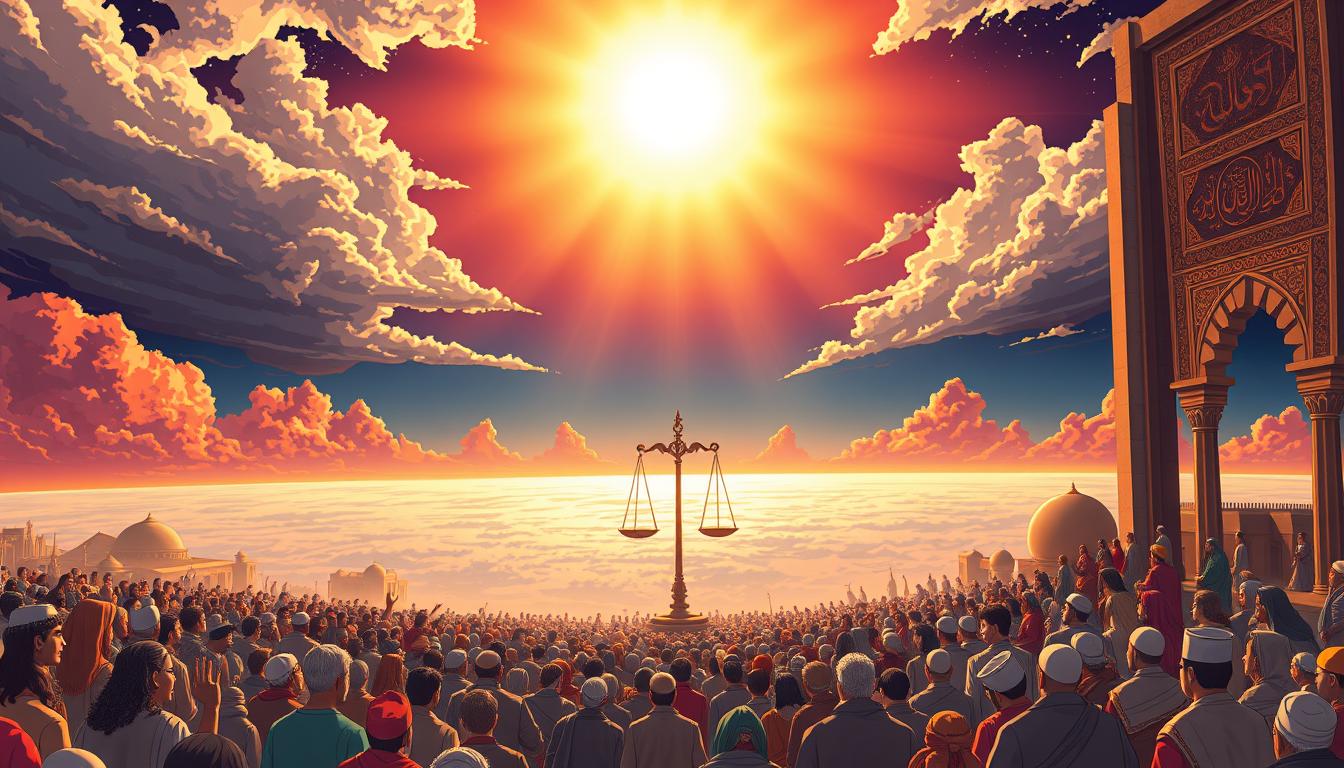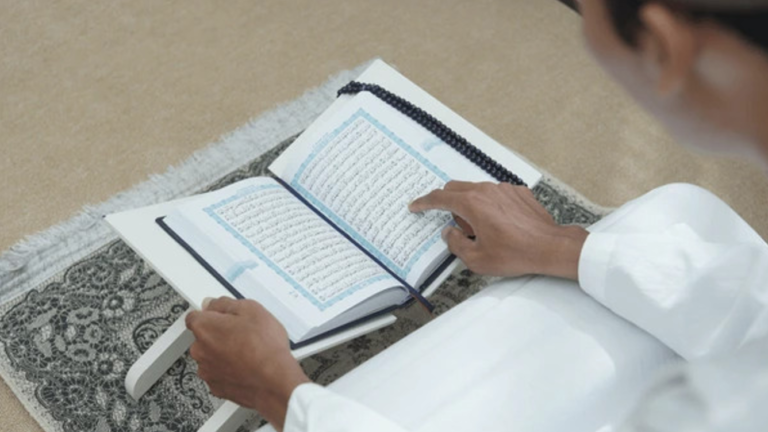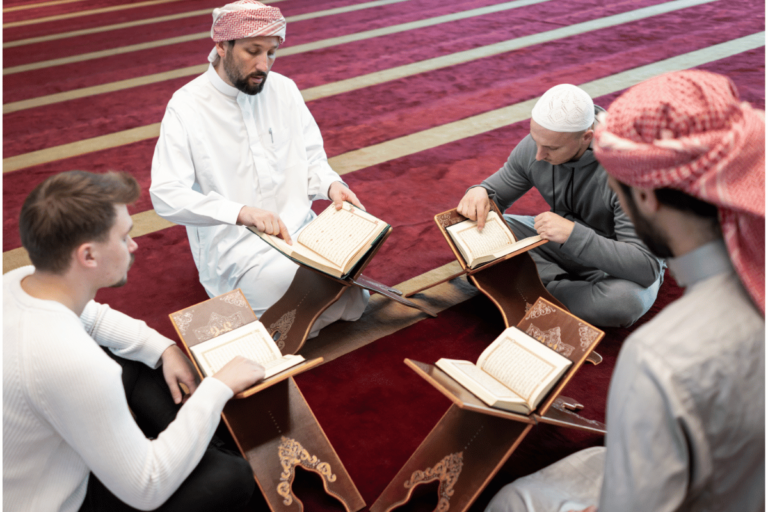Understanding Islamic Teachings on the Day of Judgment
Have you ever thought about what comes after we die? In Islam, the Day of Judgment, or Qiyamah, is very important. It’s when our life on earth ends and eternal life begins.
The Quran talks about the Day of Resurrection, or Yawm al-Qiyamah, a lot. It’s mentioned over 70 times. This shows how key it is in Islamic faith. It’s known by other names too, like Yawm ad-din (Day of Judgment).
Islamic teachings on the end of the world are similar to Christian ones. Both believe in the resurrection and judgment. But Islam also has its own special ideas, like the signs of the Hour and crossing the bridge. These ideas help shape how Muslims think about life, death, and what comes next.
The Quran guides us on how to face death and what comes after. It offers comfort in hard times, like in verse 2:156. And verse 29:57 reminds us that death is sure to come. These teachings urge Muslims to live well, knowing they’ll be judged on Judgment Day.
Key Takeaways
- The Day of Judgment is a core belief in Islam
- The Quran mentions the Day of Resurrection 70 times
- Islamic eschatology includes unique events like signs of the Hour
- The Quran provides guidance on facing death and the afterlife
- Muslims believe in accountability for their actions on Judgment Day
- Repentance plays a crucial role in Islamic teachings about the afterlife
The Significance of the Day of Judgment in Islam
The Day of Judgment is a key part of Islamic faith. It’s a belief that guides Muslim life and actions. The Quran mentions it over 300 times, showing its importance.
Core Tenet of Faith
Belief in the Day of Judgment is a main belief in Islam. It’s linked to believing in Allah and is a key part of the afterlife. This belief helps Muslims understand life’s purpose and the results of their actions.
Quranic and Hadith Emphasis
The Quran connects the Day of Judgment with justice and being accountable. It says all souls will face judgment for their actions. Over 300 hadiths also talk about this, giving more details about this day.
Impact on Daily Life
The belief in a final judgment greatly affects Muslim behavior. It pushes them to live righteously and be accountable for themselves. Muslims see life as a test leading to the afterlife. This view influences their choices and actions, encouraging them to do good and avoid evil.
“The value of this world compared to the Hereafter is like a few drops of water compared to the sea.”
This hadith highlights the shortness of life and the need to prepare for the afterlife. It encourages faith and doing good deeds.
Names and Descriptions of the Day of Judgment in Islamic Texts
Islamic eschatology gives many names to the Day of Judgment. Each name shows a different side of this important event. The Quran uses 36 names for Yawm al-Qiyamah, creating a rich picture of meanings and images.
Some common names include:
- Al-Haaq’qah (The Reality)
- As-Saa’ah (The Hour)
- Al-Qari’ah (The Calamity)
- Yawm ad-Din (The Day of Judgment)
- Yawmul-Akhir (The Last Day)
These names give a clear picture of the Day’s importance in Islamic belief. For example, As-Saa’ah talks about its sudden start. Al-Qari’ah highlights its severe nature.
The Quran says Yawm al-Qiyamah is a time of deep focus on oneself. People will be too busy with their own worries to think about others. This is shown in the Deafening Blast (Quran 80:33-42).
“On that Day shall each soul be occupied with itself alone.” (Quran 80:37)
Islamic texts also show a clear split on Yawm ad-Din. Some faces will shine with joy, while others will be covered in dust and darkness. This shows the final fate of believers and non-believers.
Signs and Portents of the Approaching Day of Judgment
Islamic prophecy talks about many signs that show the end times are near. These signs are big and small, each with its own importance in Islam.
Major Signs
The major signs of the Day of Judgment are huge events. They signal that the end times are coming. These include:
- The appearance of the Dajjal, an Antichrist figure
- The return of Jesus
- The release of Gog and Magog
Minor Signs
Minor signs are smaller hints of the Judgment Day. Islamic texts say many of these signs are happening now:
- Moral decay in society
- Increased natural disasters
- Technological advancements
Islamic scholars have found 48 signs for the Day of Judgment. 9 have happened, 13 are happening now, and 26 will happen later.
The Appearance of Al-Masih ad-Dajjal
The coming of Al-Masih ad-Dajjal is a key event in Islamic beliefs. This figure, known as the Dajjal, will appear at the end times. He will try to confuse people, testing their faith before the Day of Judgment.
As these signs appear, Muslims are urged to stay strong in their faith. They should prepare for the final day of judgment.
The Destruction and Resurrection Process
The Islamic resurrection process is a key part of the faith’s teachings. It starts with the world’s destruction, followed by the return of all souls. This event, called baʿth, is detailed in the Quran.
The first step is the sound of a trumpet, signaling the end of life. This phase, fanāʼ, means the end of all living things. The Quran talks about death over 100 times, showing its importance.
Then, Allah starts the resurrection. The Quran compares it to plants growing after rain. Bodies come back to life as Allah sends down water, showing His power.
“And among His Signs is that you see the earth barren, but when We send down water to it, it is stirred to life and growth. Verily, He Who gives it life, surely is Able to give life to the dead. Indeed, He has power over all things.” (Quran 41:39)
The Day of Judgment comes after the resurrection. It’s mentioned over 500 times in the Quran. This day is crucial in Islamic teachings, guiding believers’ actions and encouraging piety.
Understanding Islamic Teachings on the Day of Judgment
Islamic teachings focus on divine justice on the Day of Judgment. This belief guides Muslims in their daily lives. They know they’ll be held accountable for their actions.
The Concept of Divine Justice
In Islam, divine justice means Allah judges everyone fairly. This belief is at the heart of the faith. It promises Paradise to 82% of those who believe and do good.
The Quran says even small actions will be counted. This shows how important it is to live righteously.
Accountability for Deeds
Accountability is a big part of the Day of Judgment in Islam. Muslims believe they’ll face Allah to answer for their actions. This belief makes them think about their behavior and aim for good deeds.
The Prophet Muhammad compared this world to the Hereafter. He said it’s like what a finger retrieves from the sea – showing the vast difference in value.
The Weighing of Good and Bad Actions
On the Day of Judgment, good and bad actions will be weighed. This is done on a divine scale called the mizan. The balance will decide one’s fate in the afterlife.
The Quran says 85% of those who seek a religion other than Islam won’t be accepted. This understanding motivates Muslims to do good and avoid harm.
“Every soul will taste death, and you will only be given your [full] compensation on the Day of Resurrection.” – Quran 3:185
The belief in divine justice and accountability shapes Muslim daily life. It encourages righteous living and personal responsibility. It reminds believers that their actions have consequences, both in this life and the next.
The Reckoning and Judgment of Souls
In Islamic teachings, the concept of hisab is key in the divine judgment process. This reckoning happens on the Day of Resurrection. Every soul must answer for their actions on earth.
The reckoning is both personal and all-encompassing. Allah’s justice is perfect, checking every action, thought, and intention. Believers will see their sins and be forgiven. But disbelievers and sinners might face a deeper look.
On this day, people will be asked about their lives:
- How they spent their life and youth
- Their means of earning and spending wealth
- How they used their knowledge
- Their observance of prayers and fasting
- Their charitable actions
The Quran says everyone will see their deeds. The righteous will find it easy, while others might struggle. This belief guides Muslims to live morally, preparing for the afterlife.
Paradise (Jannah) and Hell (Jahannam) in Islamic Eschatology
Islamic teachings vividly describe the afterlife, focusing on Paradise and Hell. These details motivate believers to live righteously.
Descriptions of Paradise
Jannah, the Islamic paradise, is a place of eternal joy. The Quran talks about lush gardens, rivers, and luxurious homes. Believers will find joy in Allah’s presence and be with other righteous souls.
Descriptions of Hell
Jahannam, the Islamic hell, is a place of punishment and suffering. The Quran describes it as hot, with painful food and drink. It warns against sinning in this life.
Eternal Nature of the Afterlife
Islamic teachings believe in eternal life in Paradise or Hell. This belief highlights the importance of our actions today. The Quran challenges old views of time, showing the afterlife as part of our world.
“Verily, the righteous will be in bliss, and the wicked will be in the Fire.” – Quran 82:13-14
Prophet Muhammad’s Night Journey showed him Paradise and Hell. This journey confirms the afterlife’s reality. It reminds us of the consequences of our actions.
The Role of Prophets and Intercession on the Day of Judgment
In Islamic teachings, prophets play a key role on the Day of Judgment. This is known as shafaa, offering hope for divine mercy. The Quran says that intercession can only happen with Allah’s permission, showing God’s ultimate authority.
Prophet Muhammad has a special place in Islamic salvation. He’s given the gift of Major Intercession, making him unique among prophets. On this day, believers might ask for help from prophets like Adam, Noah, and Jesus. But they ultimately turn to Muhammad for help.
The process of intercession involves several steps. Prophet Muhammad asks Allah for permission, praises Him, and then intercedes for believers. This act of shafaa guides people towards Paradise. It’s important to remember that while intercession offers hope, the Quran stresses the need for personal accountability and living righteously.
Islamic tradition says that intercession benefits those chosen by Allah for His mercy. It might help those on the edge between success and failure. Yet, the Quran clearly states that no intercession shall be accepted for those who don’t deserve it. This highlights the importance of living a life that follows Islamic principles.
Source Links
- Judgement Day in Islam
- Belief in Judgement Day11 min read
- The Day of Judgment and the Resurrection (Qiyama)
- What Does Islam Say about the Day of Judgment?
- What Is the Importance of Believing in the Day of Judgment?
- Different Qur’anic Names of the Day of Judgement
- Chapter 80, Verses 33-42: A Description of Judgement Day
- Signs of the coming of Judgement Day
- 10 Signs of the Last Day that may have Appeared
- Death & Day of Judgement — LEARN ISLAM
- Islam – Eschatology, Judgment, Afterlife | Britannica
- No title found
- Mercy and Might on Judgment Day: Allah’s Name Maliki Yawm al-Din | Yaqeen Institute for Islamic Research
- What Does Islam Say about the Day of Judgment?
- Between Mercy and Might: Exploring Mercy and Justice on the Day of Judgment
- Types of Reckoning on the Day of Resurrection – Islam Question & Answer
- Accountability and the Day of Judgment – IslamOnline
- Part 1 : Soul
- Islamic eschatology
- Islamic eschatology | Islamic World Class Notes | Fiveable
- The Intercession of the Prophet on the Day of Judgment
- Intercession on the day of judgement







